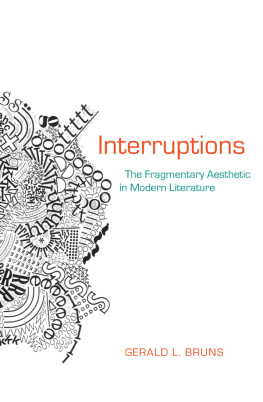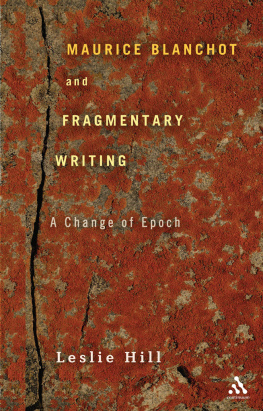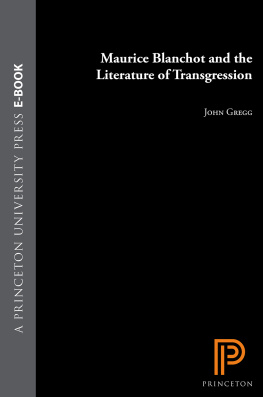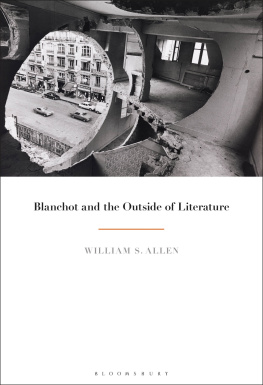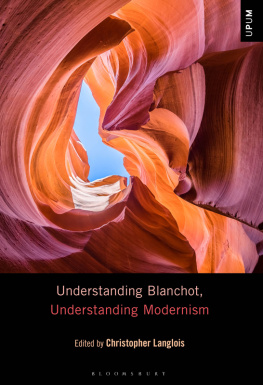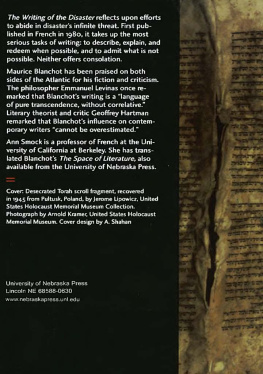Gerald L. Bruns - Maurice Blanchot
Here you can read online Gerald L. Bruns - Maurice Blanchot full text of the book (entire story) in english for free. Download pdf and epub, get meaning, cover and reviews about this ebook. year: 1997, publisher: The Johns Hopkins University Press, genre: Art. Description of the work, (preface) as well as reviews are available. Best literature library LitArk.com created for fans of good reading and offers a wide selection of genres:
Romance novel
Science fiction
Adventure
Detective
Science
History
Home and family
Prose
Art
Politics
Computer
Non-fiction
Religion
Business
Children
Humor
Choose a favorite category and find really read worthwhile books. Enjoy immersion in the world of imagination, feel the emotions of the characters or learn something new for yourself, make an fascinating discovery.

- Book:Maurice Blanchot
- Author:
- Publisher:The Johns Hopkins University Press
- Genre:
- Year:1997
- Rating:5 / 5
- Favourites:Add to favourites
- Your mark:
- 100
- 1
- 2
- 3
- 4
- 5
Maurice Blanchot: summary, description and annotation
We offer to read an annotation, description, summary or preface (depends on what the author of the book "Maurice Blanchot" wrote himself). If you haven't found the necessary information about the book — write in the comments, we will try to find it.
Maurice Blanchot — read online for free the complete book (whole text) full work
Below is the text of the book, divided by pages. System saving the place of the last page read, allows you to conveniently read the book "Maurice Blanchot" online for free, without having to search again every time where you left off. Put a bookmark, and you can go to the page where you finished reading at any time.
Font size:
Interval:
Bookmark:
Maurice Blanchot
The Refusal of Philosophy
Gerald L. Bruns

1997 The Johns Hopkins University Press
All rights reserved. Published 1997
Printed in the United States of America on acid-free paper
Johns Hopkins Paperbacks edition, 2005
2 4 6 8 9 7 5 3 1
The Johns Hopkins University Press
2715 North Charles Street
Baltimore, Maryland 21218-4363
www.press.jhu.edu
Library of Congress Cataloging-in-Publication Data will be found at the end of this book.
ISBN 0-8018-8199-4 (pbk.)
A catalog record for the book is available from the British Library.
The Library of Congress has cataloged the hardcover edition of this book as follows:
Bruns, Gerald L.
Maurice Blanchot : the refusal of philosophy / Gerald L. Bruns.
p. cm.
Includes bibliographical references and index.
ISBN 0-8018-5471-7 (alk. paper)
1. Blanchot, MauricePhilosophy. I. Title.
PQ2603.L3343Z57 1997
843.912DC20 96-34860
CIP
For Don Marshall
Maurice Blanchot (b. 1907) belongs to the generation of French intellectuals who came of age during the 1930s, survived or flourished during the Occupation, and dominated Parisian intellectual life for a quarter century or so after the Liberation. We know less about him than we would like. During the crisis years of French politics (193339) Blanchot was a journalist who moved among various groups of young intellectuals who were strongly antidemocratic, anticapitalist, anti-Marxist, antiPopular Front, and therefore (in the nature of the case) both profascist and, in varying degrees, anti-Semitic. His writings during this period are typical of what came to be called a young dissident. During the Occupation Blanchot served briefly as a director of a young persons literary association sponsored by the Vichy government and contributed essays on literary matters to the pro-Vichy Journal des dbats, but otherwise he seems to have kept himself at a distance from Collaborationist circles.
In 1941 Blanchot published his most famous narrative, Thomas lobscur (available now only in a much reduced version that appeared in 1950). In 1943 he published his first collection of critical essays, Faux pas. After the Liberation he began contributing critical essays to La nouvelle franaise and Critique on a regular basis. In 1949 he published a second collection of essays, La part du feu, which contains his most important theoretical essay, Littrature et la droit la mort, in which literature is defined against Hegel as the interruption of the dialectical movement of negation that produces concepts, works, cultures, and the end of history. A number of collections followed over the next twenty years. Blanchot became a premier example, perhaps the last example, of the intellectual whose mode of existence was the literary journal rather than the academic appointment. Meanwhile he continued as a writer of narrativesLarrt de mort (1948), Le trs-haut (1948), Au moment voulu (1951), Celui qui ne maccompagnait pas (1953), Le dernier homme (1957).
During the Algerian crisis in the 1950s Blanchot emerged as an adversary of De Gaulle and is usually credited with the authorship of the Manifeste des 121 (1960), a declaration of the right to insubordination signed by 121 intellectuals of various political sorts (Jean-Paul Sartre, no friend of Blanchots, was among the signators). Sometimes this is taken as evidence that Blanchot had shifted politically from right to left, but this seems to me a ready-to-wear judgment that a closer look might not support. In 1962 Blanchot published Lattente loubli, a work in dialogue or, more accurately, fragments of dialogue, and before long the fragment would become his characteristic form of writing, especially in Le pas au-del (1973) and Lcriture du dsastre (1980). Most recently Blanchot has published La communaut inavouable (1983), the first part of which concerns, among other things, Georges Batailles experiments in secret societies and underground communities during the late 1930s, and Les intellectuels en question (1984), an essay that, among other things, contains what Blanchot calls his personal confession [mon aveu personnel].
My purpose in this book is to work through a substantial portion of Maurice Blanchots writings, and to do so in some detail. It seems to me we are very far from understanding what his writings are about, nor do we know what sort of a reading these texts can sustain. My ambition was to do a comprehensive close reading of Blanchots work, with particular attention to those more recent texts that so far have received only modest commentary, but clearly not every question can be asked at once. A comprehensive reading could never mean adopting a single comprehensive point of view from which everything could be seen at once and understood as a whole. And no one is without confusion or the capacity for blunder, garble, and pointless digression. Nor is there a method of criticism that one could bring to bear upon these texts that would lay bare anything like an underlying logic. My method, just to call it that, is philological. Philology works from the bottom up. Since ancient times it has meant a concentration on bits and pieces of texts, moving from one fragment to another as best one can, taking guidance from the light texts shed on one another and also from whatever commentary is at hand.
Fortunately in this last respect much of what has been written on Blanchot is excellent, and, as my citations show, I rely a good deal on what others have taught me. One must mention in particular studies by Franoise Collin, Roger Laporte, and Joseph Libertson, as well as the historical research of Jeffrey Mehlman, Steve Ungar, and Michael Holland. I have found studies by Simon Critchley, Paul Davies, Donald Marshall, Allan Stoekl, and John Gregg to be especially helpful. An early essay by Geoffrey Hartman has always been important to me. There are fiction writers whom I admire, like Lydia Davis, who are among Blanchots best readers (and translators). Perhaps most illuminating are the uses that many philosophers have made of Blanchots ideas, especially Emmanuel Levinas, Jacques Derrida, Gilles Deleuze, and Jean-Luc Nancy. Ive tried in particular to consider in detail the relationship between Levinass thinking and Blanchots. It also seems to me that there is an internal coherence between Blanchot and the poet Paul Celan that is worth close study.
I first began reading Blanchot more than thirty years ago as part of an effort to understand the difference between Mallarms poetics and Martin Heideggers conception of poetry, both of which emphasize language in radical but apparently antithetical ways. Blanchot was the only writer I knew about who had studied both Mallarm and Heidegger. Moreover, his thinking brought them together in a form that seemed to me to capture something essential about poetry. Naturally I now use the word essential with some self-doubt. As my friend Marjorie Perloff has cautioned me more than once, the extension of the concept of poetry cannot be closed by a frontier. Neither Hlderlin nor Paul Celan can be made stand-ins for poetry as such. There is no poetry as such. What counts as poetry is internal to the heterogeneous social spaces in which it is composed; it can only be approached historically, that is, locally and with close attention to the facts. Poetry is, much like any form of life, untheorizable. I always end up having to agree with her about these things, but not without wondering how it might be otherwise.
Next pageFont size:
Interval:
Bookmark:
Similar books «Maurice Blanchot»
Look at similar books to Maurice Blanchot. We have selected literature similar in name and meaning in the hope of providing readers with more options to find new, interesting, not yet read works.
Discussion, reviews of the book Maurice Blanchot and just readers' own opinions. Leave your comments, write what you think about the work, its meaning or the main characters. Specify what exactly you liked and what you didn't like, and why you think so.

